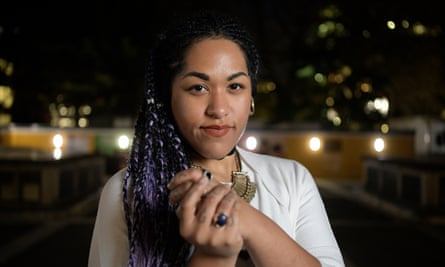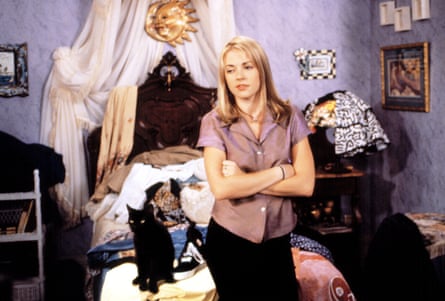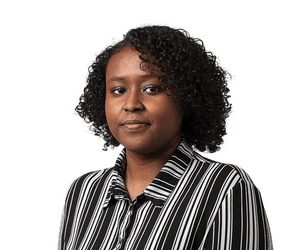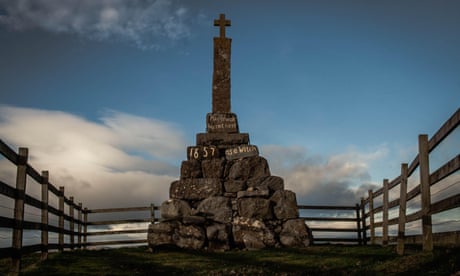'Waking up to our power': witchcraft gets political
One eve of Witchfest event, radicals say they believe magic and occult are natural extensions of feminism and eco activism

The south London borough of Croydon, often derided as the capital’s most unloved suburb, is the birthplace of dubstep and London’s modern tram network. But the area now lays claim to a new title: the UK’s witch capital.
On Saturday, about 4,000 pagans and witches will descend on Croydon to delve further into the occult. While many are simply drawn to the aesthetics of being a witch, there are a growing number of radicals in the country who believe witchcraft and magic are natural extensions of their feminist and environmental activism.
Witchfest, organised by Children of Artemis, a membership organisation open to witches and pagans, will include workshops on finding the new forest coven, moon magic, and wands. Organisers claim it is the largest witchcraft festival in the world.
The event comes as witches emerge from broom closets across the UK to take over the popular imagination. As well as the reboot of cult TV shows such as Sabrina, the Teenage Witch (remade as the Chilling Adventures of Sabrina for Netflix) and Charmed, there are witches making podcasts and sharing tips under the hashtag #witchesofinstagram, which boasts more than 3m posts. And so many books have been written that Publishers Weekly has declared a “season of the witch”.
Activists have marched with placards that call on people to “hex the patriarchy”; there is a subgroup of Extinction Rebellion for druids, witches and pagans; and self-defence classes are offered to help witches protect their minds, bodies and souls.
Ayesha Tan-Jones, 26, who cofounded Shadow Sistxrs Fight Club as a self-defence class for female, non-binary, and queer witches, said there is something inherently political in describing yourself as a witch.
“It’s about taking control of your power and taking control of owning your destiny, and owning your magic. We live in a society that is constantly bombarding us with thoughts that we are not good enough or that we need a material thing.
“In a way, we’ve lost our magic and this new awakening is about us waking up to our power. And it’s an urgent time to wake up.”

Combining Brazilian jujitsu with magical and medicinal herbalism, past classes have made herbal pepper spray, protection amulets and keyrings.
Tan-Jones admits this might appear strange to the uninitiated. “We didn’t know that there was someone doing counselling in the building we were having a class in and he kept coming round and staring at us. He must have been thinking ‘what are you doing’?’”
Christina Oakley Harrington, proprietor of Treadwell’s, a bookshop in London that specialises in the occult, said: “People who get interested in witchcraft are not the most insecure and anxious people, their desire to learn magic is very much tied up with their feeling that the world is in need of a desperate change.”
For these activists, the identity of the witch is “an empowering cloak” that gives them the power and strength to take a stand, Harrington added.
Merlyn Hern, a spokesman for Children of Artemis, said people were drawn to Wicca and witchcraft because it is more personal than what is offered by mainstream religion.
“It is more about the individual than, say, a prayer, which is very hands-off. You pray to a higher authority to make something happen, whereas a spell is totally personal and down to the individual to make sure it’s right.”
Hern said there was also a greater diversity of people embracing witchcraft. Back in the 2000s, Witchfest was largely attended by white Europeans, but the demographic has shifted in recent years. “It’s people who are more second or third or fourth generation who are breaking away,” Hern said.
Grace Gottardello, who describes herself as a “community witch,” said for people of colour, witchcraft was just as much about reconnecting with their ancestral roots and building a community as it was about reclaiming power.
Gottardello, who moved to the UK when she was 18, likens her childhood in northern Italy as a bit like Sabrina, the Teenage Witch. She learned about herbalism, new moon ceremonies and tarot reading from her aunts.
But apart from these familial rituals, Gottardello describes growing up in her village as a black woman as largely an isolating and painful experience. The town was incredibly racist, she said, and the word witch was not ever really spoken aloud.
It was only when she lived in the UK that she was able to build a community and reconnect with herself. “I was recovering my identity, recovering my connection to my mum’s tradition and recovering my blackness.
“Witchcraft is much more than tarot challenges and astrology memes. Don’t get me wrong, I love astrology memes, but witchcraft is also a tool for a community to protect ourselves.”


No comments:
Post a Comment